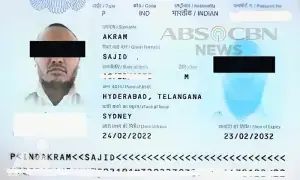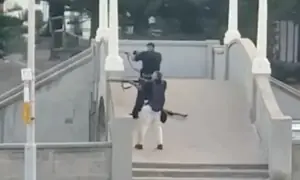Court orders Imran Khan’s jail trial, citing fear of PTI mob attack
A special court ordered on Tuesday that the trial in the cipher case should be moved to the Adiala jail once again, citing that it feared a PTI mob could attack the judicial complex in Islamabad if the case were heard there. However, the court ruled that the trial inside the jail would be held in open court.
On Tuesday, a special court resumed hearing the cipher case, where Imran Khan and Shah Mahmood Qureshi had been summoned in person. However, jail authorities told the court that the two leaders could not be brought to court due to security concerns.
Announcing his reserved verdict, Judge Abu Alhasnaat Zulqurnain ruled that the trial should be held in jail in view of security concerns reported by the government.
However, the judge ruled that journalists and five family members for each of the accused would be allowed to witness the trial.
The written order
In his written order for the hearing, Judge Zulqurnain wrote that Imran Khan and Qureshi were not produced by the jail authorities despite the court order from the last hearing.
He added that the jail authorities presented a report based on information provided by Islamabad Police, Intelligence Bureau and Special Branch which said that there was ‘serious danger’ to Khan’s life.
The judge wrote that the concerns for Imran Khan’s safety cannot be taken lightly by the court.
He also wrote that PTI workers have attacked the judicial complex in the past so more proceedings in the case will not be safe.
The judge then wrote that further hearings should be held in the Adiala Jail. He ruled that in addition to lawyers, five people from each of the accused’s family will be allowed to attend the proceedings.
The judge also added that members of the general public who wished to attend the proceedings should be allwoed to do so according the rules of the jail and the capacity of room where proceedings are held.
The hearing
On Sunday the Special Branch had called for special security arrangements at the Judicial Complex as there was a chance of a large number of Pakistan Tehreek-e-Insaf workers and lawyers appearing at the hearing.
However, as the hearing began, Adiala Jail’s superintendent told the court in a written reply that the two politicians could not be produced before the court. The superintendent said that additional security had been requested from the Islamabad police who had replied that there were serious threats to Khan and Qureshi.
The superintendent’s letter was read out in the court by Federal Investigation Agency Prosecutor Khawar Shah.
PTI’s lawyer Salman Safdar referred to the last hearing’s order and said that Khan would have to be brought to court today in any way possible.
The lawyer added that when the former PM had himself said that there were security concerns he was told to appear in court. He added that if there were any hurdles to bringing Imran to court, the court should be informed about them.
Following the arguments, Judge Zulqurnain reserved the decision which was announced later.
Imran Khan remain incarcerated since August 5 and if he had been brought to court, it would have been his first public appearance since August 5.
Court proceedings in the cipher case have so far been held inside the jail premises, first in Attock and then in Adiala. However, the Islamabad High Court declared the jail trial to be illegal on November 22.
Consequently, the cipher case hearing was held in open court where Judge Abu Alhasnaat Zulqurnain ordered that Khan and Qureshi should be produced on November 28.
Former PM Khan is accused of illegally retaining and making public the contents of a classified diplomatic cable sent by Pakistan’s ambassador in Washington.
The matter first came to light when Khan displayed the letter at a public rally in Islamabad, days before his government was removed through a no-confidence vote.
This story is being updated.
















Comments are closed on this story.